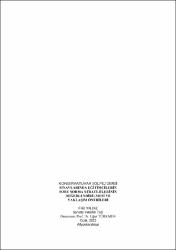Konservatuvar solfej dersi sınavlarında eğitimcilerin soru sorma stratejilerinin değerlendirilmesi ve yaklaşım önerileri
Özet
Solfej eğitimi konservatuvarlarda oldukça önemli bir alan olarak bütün alt disiplinlerin temel becerilerinin verildiği bir ders niteliğindedir. Solfej dersinde öğrencilerin edindikleri bilgi ve beceriler diğer derslerine alt yapı oluşturmaktadır. Çalma, söyleme, eser deşifre etme ve seslendirecekleri eserleri analiz etme açısından verilen bilgi ve beceriler oldukça önemli olanaklar sağlamaktadır.
Bu araştırma, konservatuvar solfej dersi eğitimcilerinin sınav yaklaşımlarının değerlendirilmesi, soru sorma stratejilerinin tespit edilmesi, teorik ve uygulama sınavlarının içerik analizinin yapılması ve araştırmacı tarafından önerilen yaklaşımları sunmak amacıyla yapılmıştır. Araştırma, Batı müziği eğitimi veren devlet konservatuvarlarının solfej dersi eğitimcileri ve sınavlarıyla sınırlıdır.
Yapılan çalışma nitel bir araştırma olup, betimsel yöntemlere dayalı olarak yürütülmüştür. Araştırma sınırlılıkları kapsamında veriler; ulaşılabilen 21 konservatuvardan 36 solfej eğitimcisi ile yapılandırılmış görüşme yapılarak ve solfej dersi sınav sorularını veren 10 konservatuvarın (5’i ortaokul, 5’i lisans eğitimi veren konservatuvarlar) sorularının solfej, teori ve dikte alanlarında içerik analizleri yapılarak toplanmıştır. Yapılandırılmış görüşme formundan elde edilen veriler, nitel araştırma yöntemlerine uygun olarak çözümlenmiş ve yorumlanmıştır. Ortaokul eğitimi veren konservatuvarların solfej dersi sınav soruları önce “solfej-teori-dikte” olarak ayrılmıştır. Solfej ve dikte soruları tek tek incelenmiş ve tonlarına, ölçü birimlerine, ölçü sayılarına, kullanılan nota değerlerine göre analiz edilmiştir. Teori sınavı soru örnekleri ise (ortaokul eğitimi veren konservatuvarların soruları) ilk olarak sınıflara göre, ardından da sınıflar kendi içerisinde temel müzik yazım kuralları, aralıklar, tonalite-modalite-makam ve akorlar olmak üzere dört başlık halinde konulara göre ayrılmıştır. Sadece lisans eğitimi veren konservatuvarlardan elde edilen teori sınavı soru örnekleri ise bazı eğitimcilerin vermiş oldukları soru örneklerinde sınıf bilgisi bulunmadığı için sadece dört başlık halinde konulara göre ayrılmıştır.
Alt problemlere göre detaylı bir şekilde işlenen veriler sonucunda konservatuvar solfej dersi sınavlarında eğitimcilerin yaklaşımları, sınav içerikleri, soru sorma stratejileri belirlenmiş ve elde edilen bulgular yorumlanarak yaklaşım önerilerinde bulunulmuştur.
Araştırmanın, Türkiye’deki konservatuvarlarda solfej dersi sınavları ile ilgili yapılan ilk çalışma olması sebebiyle alana büyük katkı sağlayacağı ve bundan sonra bu alanda yapılacak olan çalışmalara da kaynak teşkil edeceği düşünülmektedir. Solfege education, as a very important field in conservatories, is a course in which the basic skills of all sub-disciplines are given. The knowledge and skills acquired by the students in the solfege course form the basis for their other lessons. The knowledge and skills are given in terms of playing and singing, deciphering and analyzing the works they will perform provide very important opportunities.
This research was carried out in order to evaluate the exam approaches of the educators of the conservatory solfege course, to determine the questioning strategies, to analyze the content of the theoretical and practical exams and to present the approaches suggested by the researcher. The research is limited to solfege trainers and exams of state conservatories that provide Western music education.
The study is qualitative research and was carried out based on descriptive methods. Data within the scope of research limitations; The data were collected by conducting structured interviews with 36 solfege trainers from 21 conservatories that could be reached, and by making content analyses in the fields of solfege, theory and dictation of the questions of 10 conservatories (5 of which are secondary schools, 5 of which are conservatories providing undergraduate education) that give solfege exam questions. The data obtained from the structured interview form were analyzed and interpreted in accordance with qualitative research methods. The exam questions of the solfege course of the conservatories providing secondary education were first divided as “solfege-theory-dictation”. solfege and dictation questions were examined one by one and analyzed according to their tones, units of measurement, number of measures, and note values used. Theory exam questions (questions of the conservatories giving secondary school education) were first divided according to the classes, and then the classes were divided into four headings: basic music writing rules, intervals, tonality-modality-modality and chords. The theory exam question samples obtained only from conservatories providing undergraduate education are divided into four headings only, since there is no class information in the sample questions given by some educators.
As a result of the data processed in detail according to the sub-problems, the approaches of the educators in the conservatory solfege exams, the exam content, the questioning strategies were determined, and the findings were interpreted and approach suggestions were made.
It is thought that the research will make a great contribution to the field as it is the first study on solfege course exams in conservatories in Turkey and will be a source for future studies in this field.
Bağlantı
https://hdl.handle.net/11630/9958Koleksiyonlar
- Yüksek Lisans Tezleri [2074]



















